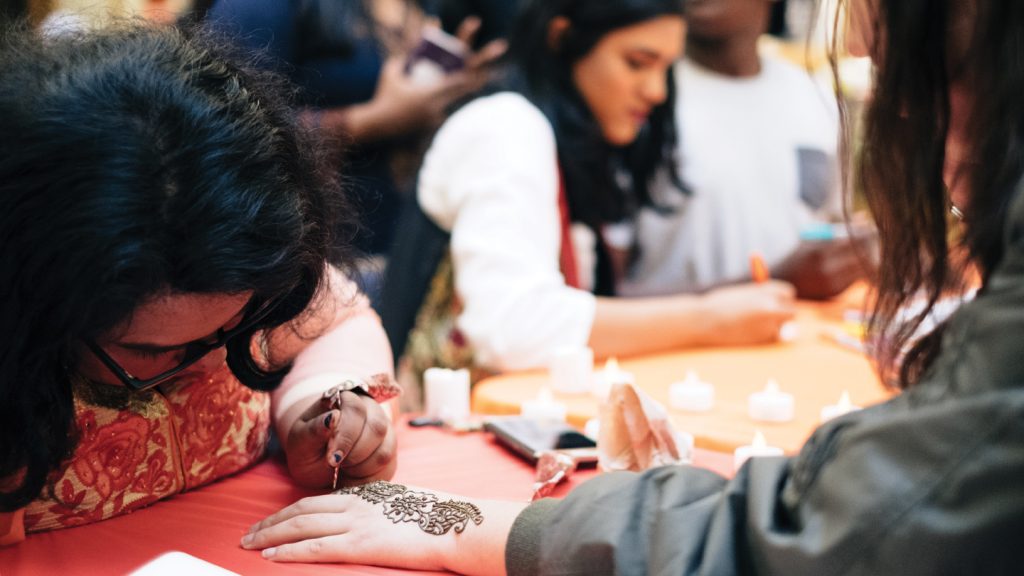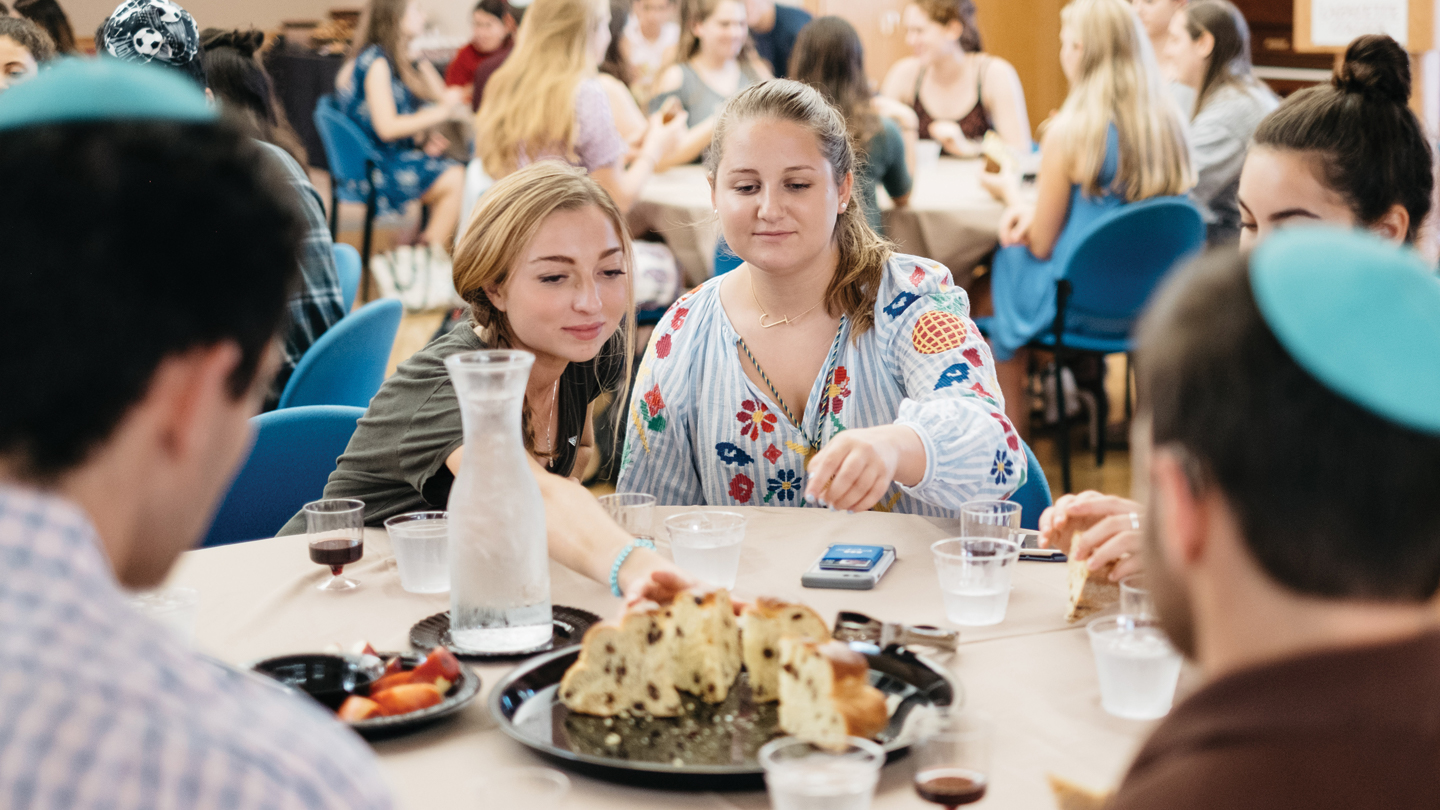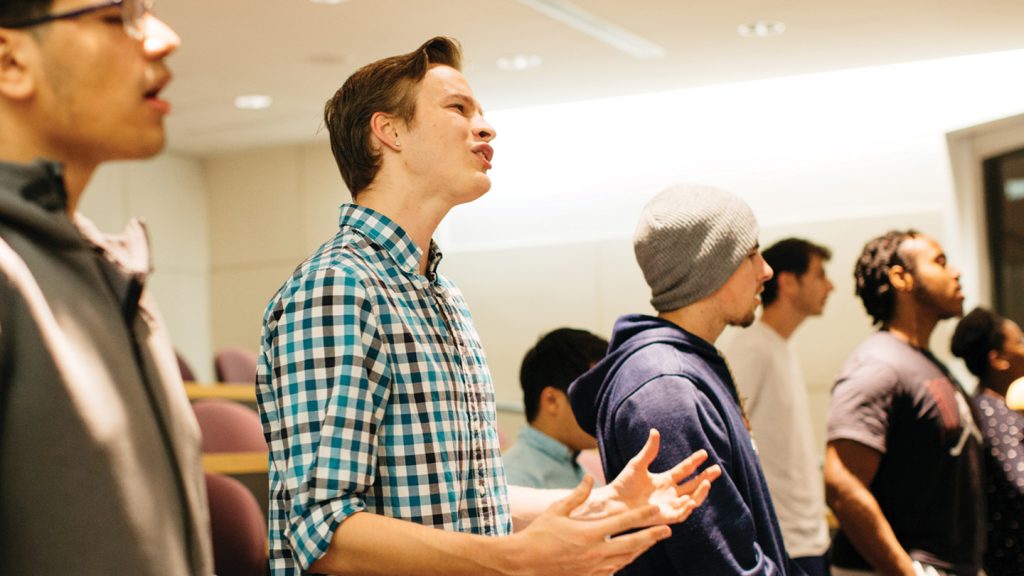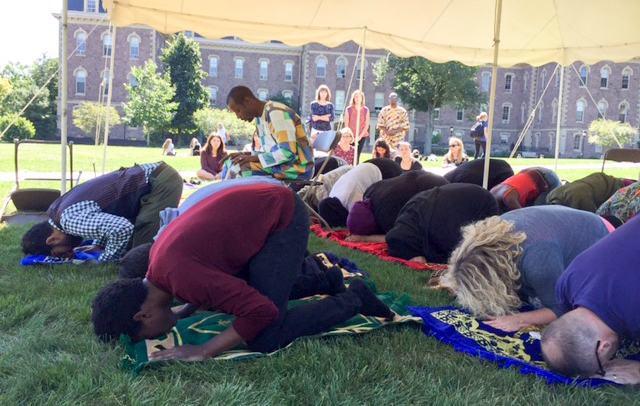Finding Faith
It’s January one year ago. The stage is set, the scene split. On one side is a group of Lafayette students visiting Washington, D.C. on the first interfaith Alternative School Break service trip. On the other is Inauguration Day. A deeply divided country is at its boiling point as some celebrate a win and others fear the future. The students, representing a variety of faiths and interested in serving a common cause, spent the week volunteering at various religious-themed community outreach programs. As part of the trip they planned to walk from their hostel near the Capitol to a mosque where they would participate in Friday prayers. To help them better understand the plight of Muslim Americans, all the women in the group had decided to wear hijabs.

“Part of it was also practical,” says Paige Fenn ’19, a member of Lafayette’s Interfaith Council, who helped organize the service trip. “We didn’t want to be fumbling with tying the head scarves outside the mosque.”
For the mile-and-a-half walk through the country’s capital, the students witness citizens at their best and worst. They see vanloads of police officers in riot gear. A crowd wearing “White Power” T-shirts blankets a spot beneath National Museum of the American Indian. Others are decked out in red, white, and blue and waving flags.
The 11 Lafayette students don’t shout or hold signs. They maneuver their way through the maelstrom in silence but remain on guard.
“What we were seeing was a little bit hard to believe,” Fenn says. It is almost as if they are on a different planet from the protected space of campus.
What they chose to do, as an act of empathy, takes on another unexpected significance.
“It felt a little bit like a protest for what this administration had been saying about Muslims,” Fenn says.
In the end, they reach the mosque safely.
“That was a really important week in my college career,” she says.
So at some point later in my life if I decide on a specific tradition, I am going to be informed by my knowledge of all other faiths.
Paige Fenn ’19
Fenn, who helped plan the trip with Rev. Alex Hendrickson, College chaplain and director of religious and spiritual life, and Amber Zuber, director of the Landis Community Outreach Center, hadn’t scheduled the trip to coincide with the new President’s first day on the job.
What was important, it turns out, weren’t the headlines they saw in the flesh, the people battling in the streets over their polarized beliefs. Instead, it was Fenn’s own faith.
As a member of Interfaith Council, Fenn attends a variety of services, faith-based clubs, and religious events.
“Faith is very personal,” she says. “So at some point later in my life if I decide on a specific tradition, I am going to be informed by my knowledge of all other faiths. It’s sort of going to be a mixture of all my other knowledge.”
This pluralism is rooted in her time at Lafayette. While the rest of the world seems to burst at the seams over religious and cultural divisions, Lafayette fosters religious tolerance and spiritual growth among its students.
Not Your Dad’s Colton Chapel
Until the mid-1960s, the College required attendance at Presbyterian church services in Colton Chapel every Sunday morning—regardless of religious affiliation. Today, there’s no such requirement, but religion still pulses through College Hill.
It no longer manifests itself with every student filing into a pew, but that’s not indicative of a loss of faith, says Hendrickson, an ordained Presbyterian minister. This generation of college students expresses its beliefs in different ways.
“It has to do with meaning-making,” she says. “I think that once upon a time, folks went to church, because that’s just what you did. That’s just kind of an expected thing. Whereas now participation in these kinds of things is a choice.”
Some parents have to adjust to their children’s newfound freedom. Every fall, Hendrickson has the same conversation with parents of incoming Lafayette first-years.
“How can I be sure that my son will be a member of Hillel?” some parents ask.
“Will I be sure my daughter will attend Mass?” ask others.
Hendrickson reminds parents that students aren’t kids any more. “You need to let them figure things out,” she says.
They do figure it out—some by choice and some by chance.

South Asian Students Association hosting a celebration of the Hindu festival of Diwali.
At the heart of this journey is Interfaith Council, a group culled from the leadership of various faith-based student organizations. Each month, a handful of Jewish, Muslim, and Christian students and religious leaders gather in Hogg Hall’s Interfaith Chapel over sandwiches to talk, plan social outings, and work together on common goals like supporting a refugee family and hunger outreach.
“These groups are friends with each other,” notes Hendrickson.
During a December council meeting, Young Life member Andrea Killian ’19 invited other students to join the Christian organization in the basement of Hogg Hall at 4:15 on Thursdays to pray for the campus community. “If anyone from Newman [the Catholic organization] would like to join us, we’d love to have you,” she said. “Or anyone at all, that is.”
DiscipleMakers, a Christian fellowship, launched a “pizza outreach.” Students can text a theological question to the DiscipleMakers’ cell, and they get a free slice of pizza and an answer delivered to their door. Questions often cover differences between denominations and have ranged from “What is the Holy Trinity?” to “What’s the difference between Catholics and Protestants?”
“What better way to reach college students than with pizza?” says DiscipleMakers member Zach Miller ’20.
The Newman Association also uses food to draw interest at its occasional get-togethers. “We don’t talk about religion at dinner,” says Emily Boyle ’20, who joined the group because she was looking for a community of friends with similar religious beliefs. “It’s geared more for people to come in, meet other people, and ask questions if they have them.”
Hillel Society’s services have drawn larger crowds than in previous years, says Gabby Tropp ’20, the Jewish organization’s newly elected president. Even students from other faiths occasionally attend Friday night service in addition to worshipping at their own.

In the spring, Tropp plans to use funding she received from a fellowship from Hebrew Union College in New York to create a program to improve understanding between faiths.
“The problem I’m seeing [among millennials] is that we never get the chance to do our own thinking about religious texts,” she says. “We read people’s interpretations. Especially as Jews. We read what rabbis say … we never are asked ‘What do you think?’”
So before spring break, Tropp wants to create an event where students from a variety of faiths—Muslim, Catholic, Protestant, Jewish—will examine a religious text they have in common and look for differences and commonalities.
“I’ve never seen so much student activity on behalf of others since the late ’60s and early ’70s,” Robert Weiner, Jones Professor of History and Jewish chaplain, told the group. “I don’t think we’ve ever had anything like it on a consistent basis. It’s remarkable.”
Raising Religion
While she now organizes interfaith trips to Washington, D.C., Fenn’s early years were not shaped by religion. Her parents and grandparents didn’t go to church. But “everyone was Christian by default,” she says, and she had at least a familiarity with a number of world religions before she started at Lafayette as an art and biology double major.
Then she took Hendrickson’s course on the World Parliament of Religions and became hooked.
“I talked with Alex, and I was interested in staying involved with religious life on campus,” she says, “even though I wasn’t a member of any particular group.”
Other students grew up in households where religion permeated most things.
The parents of Ilana Goldstein ’19 came from “lax Jewish households” but wanted their daughter to have a more religious upbringing. She attended Hebrew school two days a week in her New York City community, went to synagogue nearly every Friday and Saturday, and participated in synagogue charities. In her teens, she began to question her faith. She went to a secular school and felt like others “made me feel bad for being Jewish.” When she came to Lafayette, she joined Hillel Society.
“I felt like I had found my community,” she says. “Nobody ever makes you feel bad … However you see yourself as being Jewish, we accept you.”
Now she’s considering rabbinical school after graduation.
Killian grew up attending her family’s First Presbyterian Church in Saratoga Springs, N.Y. Before she came to Lafayette, she met her roommate on Facebook after posting that she was “looking for a roommate [who is] if not willing to get up and go to church with me on Sunday, at least not hostile to that.” Her roommate was willing; the two have been together for three years and attend College Hill Presbyterian Church. Exposure to other faiths, as well as discussions in some of her classes, has challenged her to look more deeply at her own religion. That’s strengthened her beliefs, she says.
Charles Evans ’19 found a local Baptist church after arriving at Lafayette. At home in Alexandria, Va., he attended a nondenominational church.
“A lot of us come from a church-going background, and then once we get here we realize that we don’t have to go to church any more,” he says. “But for a lot of us, it’s just engrained in who we are. We feel an obligation to sort of be God’s people, so as a result we try our best to find any aspect, whether it be on the hill or off the hill, to really just be a witness.”
Now he attends Shiloh Baptist Church with a growing number of his fellow students. At first he was one of few to attend; now the number of students in Shiloh’s pews has swelled to 20.

Many Catholic students attend mass at Saint Philip & Saint James Catholic Church in nearby Phillipsburg.
“I’ve tried to encourage students in the last five years or so to make connections to local congregations and communities in Easton,” Hendrickson says. “I think some students who have done that have found it to be really very meaningful.”
Recently, one of the Catholic students was confirmed at the Phillipsburg parish.
Some students practice their faith by educating others about it. That’s the case of Ayat Husseini ’20, who is working to change common misconceptions about Islam.
Born in Lebanon, Husseini moved to New York when she was 3 years old. Her parents were devout Muslims, but they wanted Husseini to have an appreciation for other beliefs. They took her to churches and other places of worship.
At Lafayette, Husseini has worked with Interfaith Council and Hendrickson along with Muslim Students Association. She is a member of the board of Tapestries, a multidisciplinary project geared to celebrate Muslim culture from around the world on Lafayette’s campus. In September, as part of Tapestries, Tunisian singer Cheikh Lo performed at Williams Center for the Arts. During his visit, Husseini and a few dozen other students participated in their first-ever public Muslim prayer on Lafayette’s Quad.
Other events have called on students who support Islam to wear hijabs or kufis. Many students have responded well, Husseini says.
Making Room for Faiths
While the majority of Lafayette students still come from the Judeo-Christian tradition, there are more students of varying backgrounds. Of the current student population, 1.5 percent is Muslim. Though there are fewer Buddhists, Sikhs, and Hindus, they are enrolling in greater numbers than before.
Growing diversity has brought about a shift in infrastructure, Hendrickson says.
Several years ago, Lafayette opened a Muslim prayer room in Hogg Hall. In the dining hall, all chicken is Halal, which means it was butchered in a way that complies with Islamic law.
There are minor cultural misunderstandings. A resident adviser in one of the dorms recently had words with a student over clutter—the woman continually left her shoes in the hallway. When the adviser spoke to the student, she discovered the woman, who came from Southeast Asia, was observing the Hindu holiday Diwali, and leaving shoes outside was part of the tradition.
It has to do with meaning-making. I think that once upon a time, folks went to church, because that’s just what you did. Whereas now participation in these kinds of things is a choice.
Rev. Alex Hendrickson, director of religious and spiritual life
More changes to accommodate beliefs are being discussed, Hendrickson says. For example, at the moment the College doesn’t offer dean’s excuses for religious observance. So a student fasting and avoiding water for the Muslim holy month of Ramadan is expected to maintain the same rigorous schedule as those eating regular meals and keeping hydrated.
In 2018, Commencement will take place during Ramadan. So the College will have to find ways to accommodate Muslim families.
As Lafayette continues to grow—increasing its student population by about 400 over the next six to eight years—growing the understanding of faiths will be necessary.
“How will we make space as we grow?” Hendrickson says. “These are the things Lafayette needs to think about.”
“I Can Talk Openly About God.”
One night, after a Young Life meeting, Killian and Goldstein, who’d come to visit, got to talking about Jesus.
“I said something not insightful at all like Jesus was really cool and a great guy,” Goldstein says.
Killian wasn’t offended by Goldstein’s lack of formality about Jesus. Instead, the two chatted and cracked good-natured jokes about theological beliefs. Neither student attempted to sway or indoctrinate the other. “We were laughing a lot,” Goldstein says.
For many Lafayette students, that’s religious life these days on campus. The compulsory Presbyterian service has been supplanted by variety; somber adherence to tradition has been replaced by intercultural understanding and service projects.
Dogma and practices may differ among faiths, Hendrickson says, but often all faiths support the same end goals.
Evans is vice president of Association of Black Collegians. The president of the organization, Khadijah Jinnah Khai Akeem ’19, is a Muslim.

“I find everybody knows how much I practice my faith, and Lafayette has never really felt like a place where you had to keep your religion on the low,” Evans says. “I can openly talk about God; I talk about God all the time. Kadijah’s very comfortable talking about religion. And it’s just a space where I feel as though nobody’s going to judge me for that. If you have somebody who differs in their faith, you can really have a conversation and just talk about where things differ.”
In that regard, Lafayette may very well be a separate planet from the one students experienced on Inauguration Day. In creating a space where discussion is based on knowledge and empathy, and challenges require people to look more deeply at what defines them, the College is strengthening not only the faith of its students but also their belief in a better world.